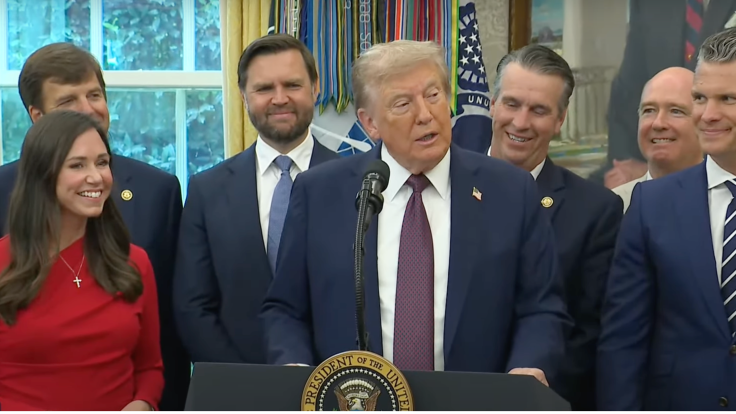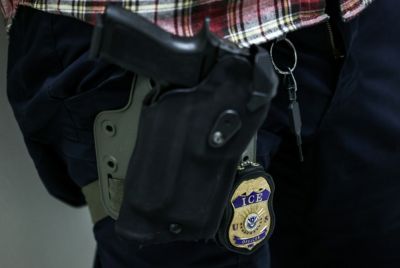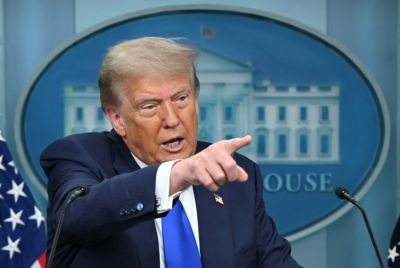Donald Trump Finally Addresses Fake News About His Death While Taking a Slight Jab at Joe Biden
Trump quashes death hoax rumours, showcases wellness despite health speculation, and lands a pointed remark about his predecessor's visibility

In a press conference that mixed affirmation with a pointed political barb, US President Donald Trump firmly labelled death rumours swirling online as baseless.
He assured the public that he had been 'very active' over Labour Day weekend, countering social media speculation with evidence of golf, interviews and family time, while subtly contrasting his visibility with that of Joe Biden's.
The remarks capped a media frenzy fuelled by absence from the public eye, bruised hands and swollen ankles. Trump's remarks appeared to serve dual purposes: restoring confidence in his health while undermining media credibility and his opponent's image.
The Rumour Mill and Trump's Rebuttal
Over the Labour Day weekend, a conspicuous lack of public appearances sparked intense speculation across social media. Hashtags like #TrumpIsDead and #WhereIsTrump trended on X, as political observers noted that even the world's search engine hallmarked 'is Trump dead' among its top queries.
On Tuesday, in a rare Oval Office appearance, Trump was asked about the false death theories. Pausing briefly, he replied, 'Really? I didn't see that. Later, he bluntly asserted the claims were 'fake news' and insisted, 'I was very active over the weekend. I went out to visit some people at the club that I own pretty nearby on the Potomac River.'
@bbcnews President Trump dispelled viral rumours that he had died, saying he was “very active” this past weekend. #DonaldTrump #USNews #BBCNews
♬ original sound - BBC News - BBC News
Meanwhile, the White House attributed visible bruising on Trump's hand to frequent handshaking and aspirin use, while confirming he has chronic venous insufficiency (CVI), a common, benign leg-vein condition. These health disclosures aimed to quell anxiety about the President's well-being.
A Subtle Political Dig Amid the Drama
Not content with purely medical rebuttal, Trump leaned into partisan contrast. He quipped, 'You wouldn't see [Biden] and nobody ever said there was ever anything wrong with him. And we know he wasn't in the greatest of shape.' His comment emphasized a recurring theme: while Biden's absence is overlooked, Trump's every inactivity is magnified.

News outlets reported that official medical figures, including Trump's vitals, confirmed no critical health issues. Physicians ruled out conditions like deep-vein thrombosis or systemic illness. His weight, blood pressure, pulse and overall condition were described as stable.
Voice, Visibility and Viral Fear
Despite attempts to show normalcy, some observers remained unsettled. A phone interview on a conservative podcast revealed a raspy, hoarse voice, leading some social users to worry that Trump sounded 'tired', 'rough' or 'weak'.
The physical signs, bruised hand concealed by makeup, swollen ankles hidden behind podiums, had already been a subject of visible concern.

In the past month, bruises became more frequent, prompting fresh waves of health speculation. Vice President JD Vance's remark that he was 'ready' to assume presidential duties should anything happen sparked widespread anxiety online, especially when coupled with posts suggesting Trump had vanished.
Wider Concerns About Online Misinformation
False reports about the deaths of public figures are a recurring feature of the digital landscape. In February 2022, fabricated claims that Queen Elizabeth II had died circulated on Twitter, now X, weeks before her actual passing, prompting fact-checks. Similar hoaxes have targeted former President Joe Biden, Pope Francis and celebrities including Dwayne 'The Rock' Johnson and Tom Hanks, with false posts spreading widely before being debunked.

A 2023 report by the Reuters Institute for the Study of Journalism concluded that misleading political content often spreads faster than verified updates, particularly when supported by manipulated visuals or sensationalist headlines.
Experts warn that the repeated circulation of such hoaxes erodes public confidence in both media and political institutions. Without swift and authoritative denials, rumours risk embedding themselves into public perception, particularly during politically sensitive moments.
The false reports about Donald Trump's death fit squarely into this broader pattern of high-profile hoaxes amplified online. Like similar cases, the speed of the rumour's spread accentuated how quickly misinformation can gain traction before authoritative denials are issued.
One thing is clear: Trump may joke that conspiracies die hard — but today, they did.
© Copyright IBTimes 2025. All rights reserved.




















